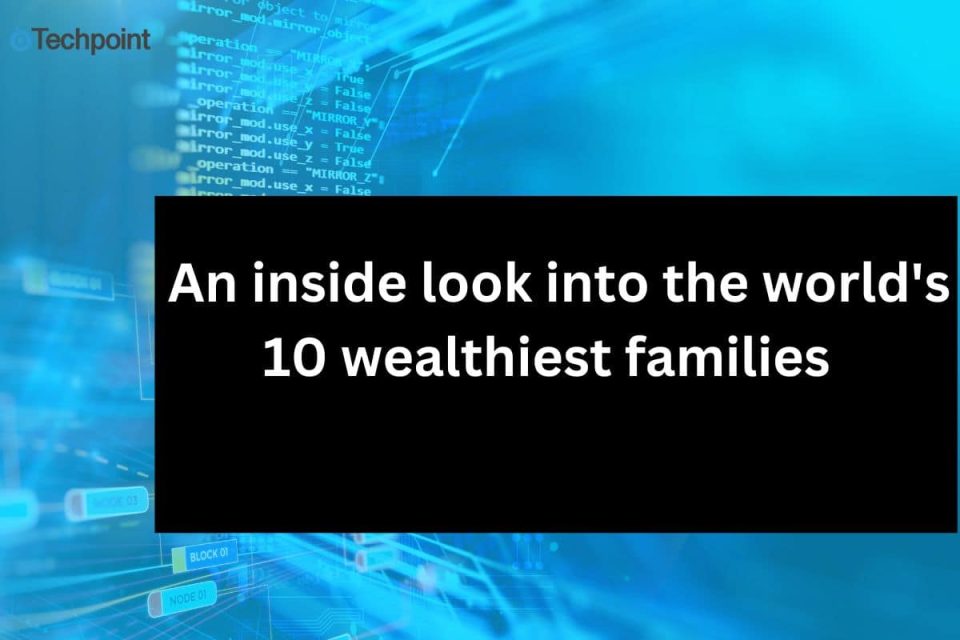Several things are subjective, like, say, beauty, but wealth? Never been one of those. Sure, some people still regard wealth as a relative thing since different people need money and property in different proportions based on their culture, location, and personal expectations to feel financially comfortable.
But that belief doesn’t matter much because wealth is mostly a scalable concept, a thing of numbers. In other words, It’s a “show me how much you have and I’ll tell you how much you are”reality. Thus, a Tesla car owner and a Suzuki power bike owner cannot be considered to be on the same wealth level.
Currently, 10 families have gone through the wealth scale and emerged as the world’s wealthiest. This article shines a lens on each of them to provide inside looks into their sources of wealth, net worths, and other great details that brought them to this point.
Let’s begin!
Key takeaways
- The Walton family remains the world’s richest, primarily through Walmart, with an estimated net worth of $432 billion.
- Oil-rich royal families from the Middle East, such as the Al Nahyan (UAE), Al Thani (Qatar), and Al Saud (Saudi Arabia), dominate the top ranks.
- European luxury and American industrial dynasties (Hermès, Koch, Mars, Wertheimer, Thomson) round out the list.
- The Ambani family is the only Asian entry from India’s list with a net worth of $100–116 billion.
- This article discusses the families’ philanthropic efforts, public controversies, and the societal impact of their businesses.
1. Walton Family
- Citizenship United States
- Net Worth: $432.4 billion (as of December 2024)
- Company: Walmart Inc
- Source of income: Retail (Walmart), investments via Walton Enterprises
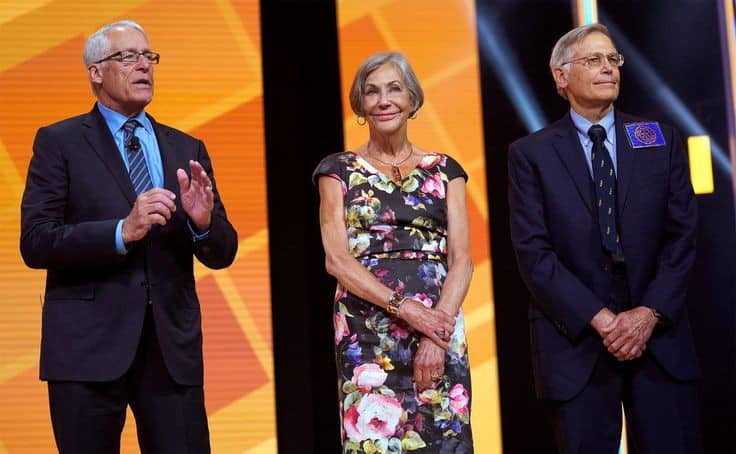
The Walton family is the wealthiest in the world, with money stats that eclipse even the richest black individual billionaires. Their wealth is deeply rooted in Walmart, the world’s largest retailer, and has been carefully managed and passed across three generations.
Walton’s story into wealth is not just one of amassing wealth but about strategic planning, family cohesion, and the transformation of American retail. Beginning with the dedicated work ethic of Sam Walton, born in 1918, who founded Walmart in 1962 in Rogers, Arkansas. Sam drew capital from personal savings and loans and, with his brother Bud Walton, opened a discount store with the vision of providing low prices to rural and suburban America. The company quickly expanded, going public in 1970, which fueled further growth.
A life-changing moment came in 1953 when Sam Walton, following his father-in-law’s advice, structured the business as a family partnership. He allocated 20% stakes to each of his four children: Jim, Rob, Alice, and the late John T., while he and his wife Helen retained the remaining 20%. This move not only minimized future estate taxes but also ensured long-term family control and financial prudence.
Today, Walmart is the world’s largest retailer by revenue, generating over $648 billion in annual sales and employing more than 2.2 million people globally. The family’s wealth is primarily held through Walton Enterprises, an investment holding company that owns just under 50% of Walmart’s shares as of 2024.
Although the family remains deeply involved in Walmart’s governance, Greg Penner, Sam Walton’s grandson-in-law, is the board’s current chairman, succeeding Rob Walton in 2015.
Here’s a list of notable family members and their individual net worth
- Jim Walton: $117.7 billion
- S. Robson Walton: $119 billion
- Alice Walton: $109.8 billion
- Lukas Walton: $40.9 billion
- Christy Walton: $19.9 billion
- Nancy Walton Laurie: $16.1 billion
- Ann Walton Kroenke: $13.4 billion
On the philanthropic front, the Walton Family Foundation is one of the largest charitable organizations in the U.S. The Foundation has committed over $1 billion (2016–2021) to expand educational opportunities, including a $250 million grant for charter school facilities. However, it has since expanded to support environmental initiatives and community development.
Despite their philanthropic efforts, the Waltons have faced criticism for Walmart’s labor practices, including low wages, limited benefits, and anti-union policies. The company’s impact on small businesses and rural economies has also been debated. Nonetheless, Walmart remains a major employer and a long-time global retail player.
2. Al Nahyan Family
- Citizenship: United Arab Emirates (Abu Dhabi)
- Net Worth: $300 to $324 billion
- Company: Royal Group, International Holding Company (IHC), Abu Dhabi Investment Authority, and other state-linked entities
- Source of wealth: Oil reserves (Abu Dhabi), sovereign wealth funds, diversified global investments in banking, real estate, technology, sports, and luxury assets
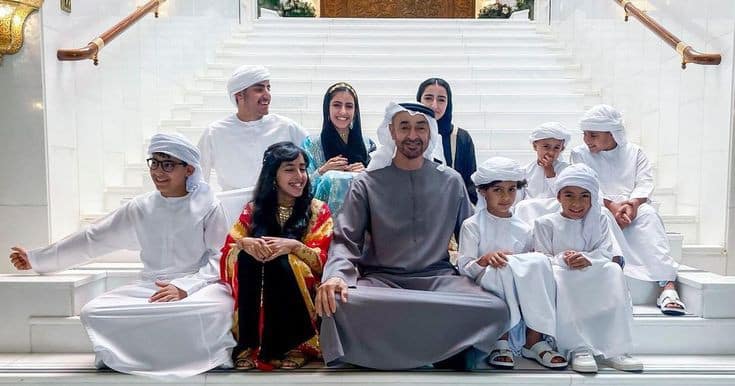
Also called the “House of Nahyan,” the Al Nahyan family is the second wealthiest family and most influential dynasty in the world after briefly overruling the Walton Family in 2023.
The wealth growth in this family goes far beyond their monastery ruling streak, which started in the 18th century, the discovery of oil in the 1950s, to Sheikh Zayed bin Sultan Al Nahyan, the family patriarch, who unified the UAE in 1971 and laid the foundation for both national modernization and family prosperity.
Their business empire rapidly expanded beyond oil, where they control about 6% of the world’s oil reserves, underpinning the UAE’s economy, to banking, where they have a major stake in First Abu Dhabi Bank, the UAE’s largest lender. Ownership of Manchester City Football Club and a majority stake in City Football Group, with clubs in multiple countries; investments in SpaceX and Fenty, and a global property portfolio of palaces including Qasr Al-Watan in Abu Dhabi, luxury properties in London, New York, Paris, Geneva, etc.
While admired for transforming Abu Dhabi into a global economic hub, the family often faces criticisms for the opacity of their finances, the blurred lines between state and personal wealth, and ongoing human rights concerns in the UAE.
Sheikh Mohamed bin Zayed Al Nahyan (MBZ), the current President of the UAE and ruler of Abu Dhabi, leads the family. His brothers, Sheikh Tahnoun bin Zayed (head of Royal Group and IHC) and Sheikh Mansour bin Zayed (Deputy Prime Minister and owner of Manchester City FC) make key decisions in state and family business affairs.
3. Al Thani Family
- Citizenship: Qatar
- Net Worth: Over $170 billion
- Company: Qatar Investment Authority (QIA) and various royal holdings
- Source of wealth: Oil and natural gas, sovereign wealth fund investments (including stakes in Barclays, Volkswagen, Harrods, Paris Saint-Germain FC, and more), real estate, global finance
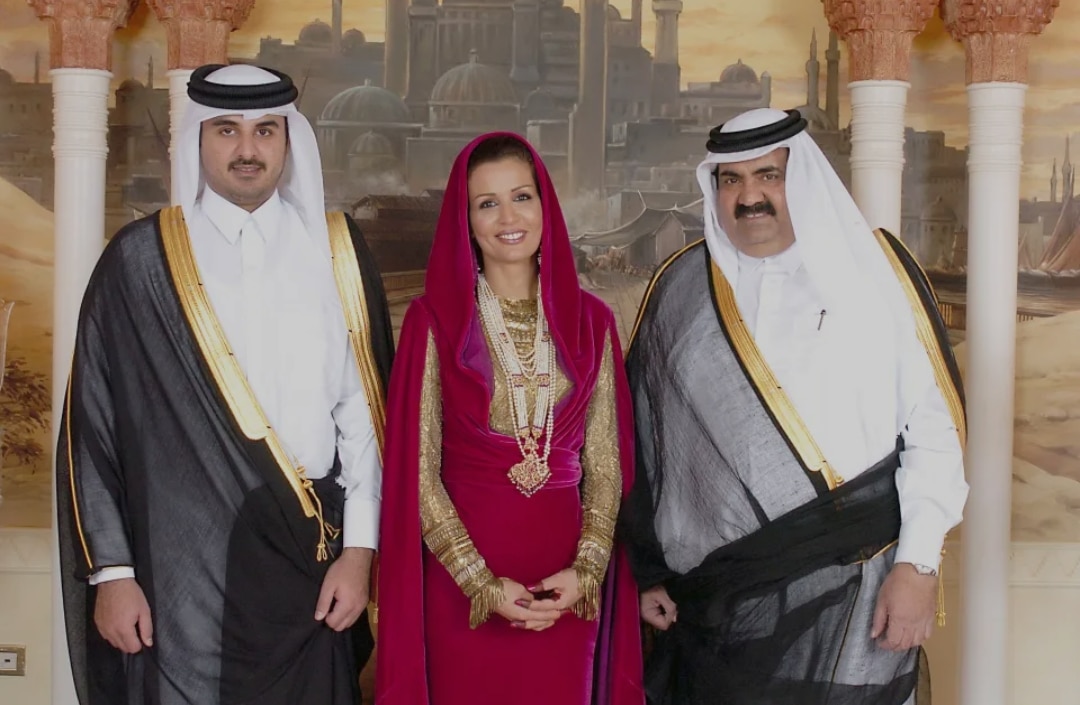
The Al Thani family, rulers of Qatar, have amassed over $170 billion, primarily through controlling one of the world’s largest natural gas reserves and a highly diversified sovereign wealth fund.
The family’s rise to global prominence began with the discovery of oil and natural gas in the mid-20th century. Since then, the Qatar Investment Authority (QIA), established in 2005, has been instrumental in managing the country’s wealth, investing in a broad portfolio of international assets. These include stakes in luxury retailers like Harrods and Printemps, major shares in automotive giant Volkswagen, and ownership of Paris Saint-Germain Football Club, which has become a symbol of Qatar’s global ambitions.
The family has also invested heavily in real estate, finance, and media, leveraging their wealth to increase Qatar’s soft power worldwide. Philanthropically, the Al Thani family supports education and research through the Qatar Foundation and has promoted cultural and sporting events, notably hosting the 2022 FIFA World Cup.
Despite these achievements, the family faces criticism over labor rights abuses, particularly concerning migrant workers involved in infrastructure projects, as well as restrictions on press freedom and political dissent. The current Emir, Sheikh Tamim bin Hamad Al Thani, continues to steer the family’s wealth and influence, balancing modernization efforts with traditional governance.
4. Hermès-Dumas Family
- Citizenship: France
- Net Worth: Approximately $170.6 billion
- Company: Hermès International S.A.
- Source of wealth: Luxury goods (fashion, leather, accessories, fragrances), family control of Hermès since its founding in 1837, reinvestment and expansion into global luxury markets
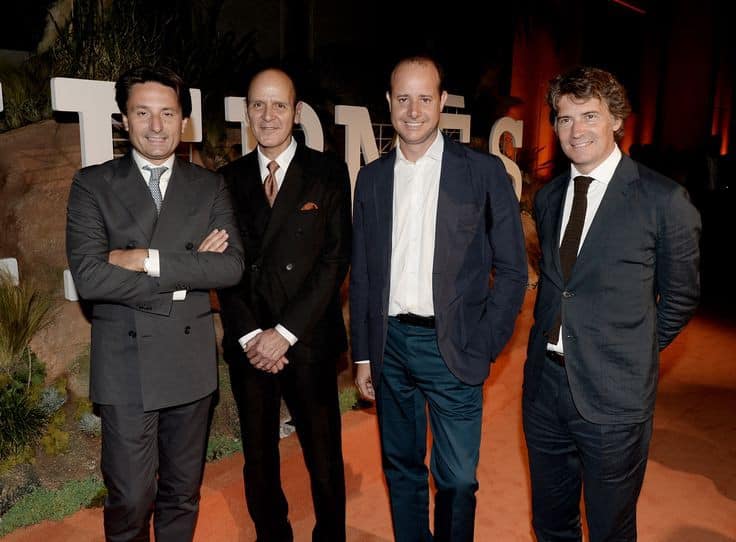
The Hermès-Dumas family owns the quintessential European luxury brand, Hermès. The company’s origins date back to 1837, when Thierry Hermès founded a harness workshop in Paris catering to the European aristocracy. Over nearly two centuries, the business evolved into a global luxury brand renowned for its leather goods, silk scarves, perfumes, and haute couture. The family has maintained tight control over the company, ensuring that Hermès remains synonymous with craftsmanship, exclusivity, and heritage.
Introducing iconic products such as the Kelly and Birkin bags helped cement its reputation worldwide. Today, the company employs over 19,000 people and generates billions in annual revenue. The family’s stewardship has emphasized long-term growth and quality over rapid expansion, resisting pressures to dilute the brand’s exclusivity.
The Hermès family’s philanthropic activities include supporting arts, crafts, and cultural preservation, including funding museums and artisan training programs. While the brand occasionally faces criticism over its use of exotic animal skins, it remains a benchmark for luxury and heritage in the fashion industry.
5. Koch Family
- Citizenship: United States
- Net Worth: About $148. 5 billion
- Company: Koch Industries
- Source of wealth: Diversified conglomerate (energy, chemicals, paper, agriculture, finance, and more), founded in 1940 by Fred C. Koch, expanded by his sons Charles and the late David Koch
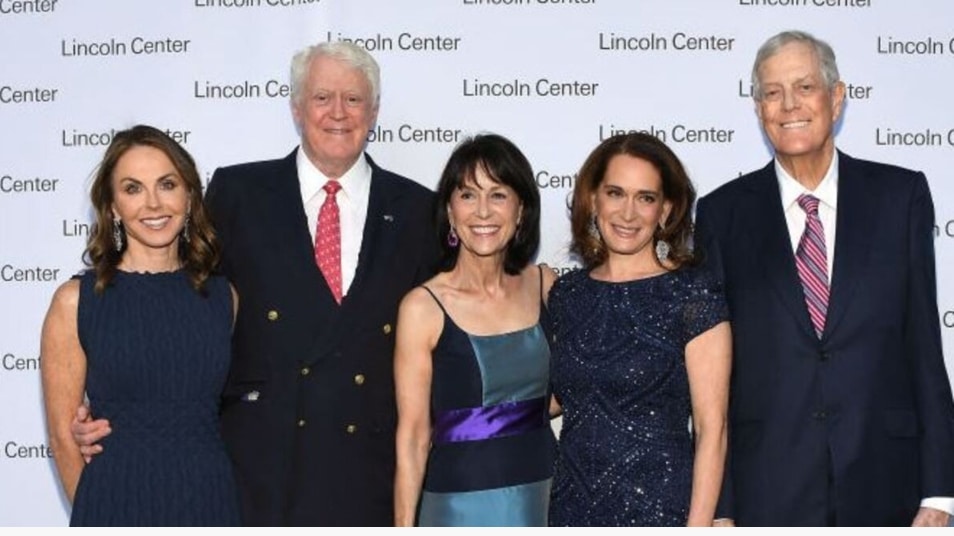
With a booming fortune of $148. 5 billion, the Koch family has built an empire that ranks among the world’s wealthiest dynasties. Their wealth is acquired from Koch Industries, one of the largest privately held conglomerates. The company’s roots trace back to 1940 when Fred C. Koch established it with a focus on oil refining technology.
Fred’s sons, Charles and David (who passed away in 2019), truly transformed the business into the behemoth it is today. Under their leadership, Koch Industries expanded beyond its original scope into a diverse portfolio encompassing energy, chemicals, paper products, fertilizers, and financial services. The company now provides livelihoods for more than 120,000 employees worldwide.
Beyond their business acumen, the Koch family has become linked with political influence in America. They’ve channeled significant portions of their wealth into supporting libertarian and conservative causes through various foundations and political action committees. Their philanthropic endeavors, primarily conducted through the Charles Koch Foundation, focus on education initiatives, criminal justice reform programs, and medical research advancement.
However, the family’s reputation isn’t without its tarnishes. They’ve faced substantial criticism regarding their environmental record and political activities. Critics have accused the Kochs of bankrolling climate change denial campaigns and actively fighting against environmental regulations that might impact their business interests.
Despite these controversies, the Koch family remains an undeniable powerhouse in American business and politics. Charles Koch continues to steer the company and oversee the family’s extensive philanthropic portfolio, ensuring their influence will be felt for generations to come.
6. Al Saud Family
- Citizenship: Saudi Arabia
- Net Worth: About $140 billion
- Company: Saudi Aramco (state oil company), various royal holdings
- Source of wealth: Oil production, government contracts, real estate, investments through sovereign wealth funds
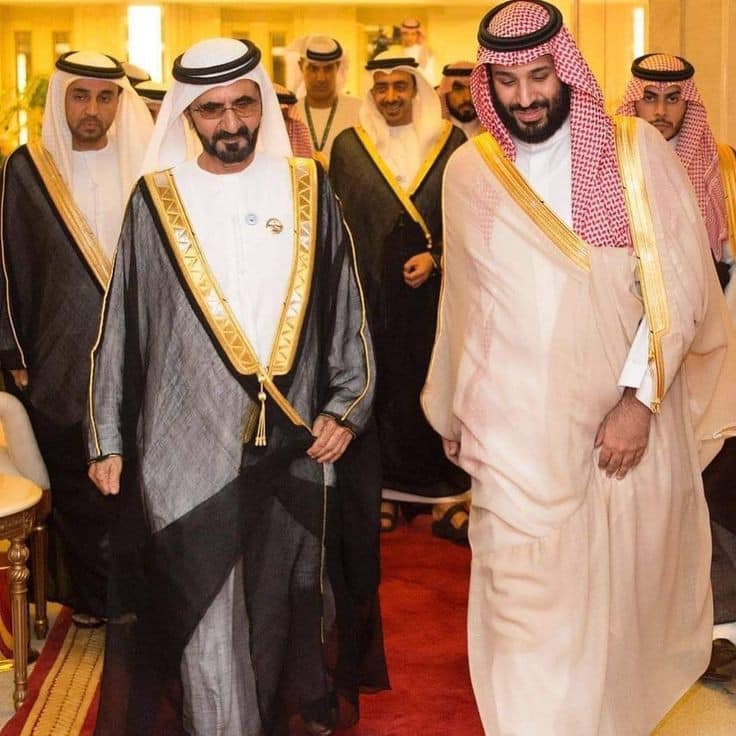
The Al Saud family rules Saudi Arabia through a centuries-old monarchy. Their enormous fortune comes primarily from the country’s vast oil reserves, which they control through Saudi Aramco, the world’s most valuable company.
The family’s wealth is deeply intertwined with Saudi Arabia itself. As kingdom rulers, they receive substantial income from government operations, royal stipends, and privileged access to lucrative contracts. Thousands of family members benefit from this system, though wealth is not evenly distributed among them.
Beyond oil, the Al Sauds hold extensive investments worldwide through sovereign wealth funds like the Public Investment Fund. Their portfolios span real estate in major global cities, stakes in technology companies, and diverse business interests in Saudi Arabia and internationally.
Crown Prince Mohammed bin Salman, the kingdom’s de facto ruler, has pushed to modernize the Saudi economy through his “Vision 2030” plan. This initiative aims to reduce oil revenue dependency by developing the tourism and entertainment sectors.
7. Mars Family
- Citizenship: United States
- Net Worth: Roughly $137. 4 billion
- Company: Mars, Incorporated
- Source of wealth: Confectionery (Mars, Snickers, M&M’s), pet care, food products, privately held since 1911
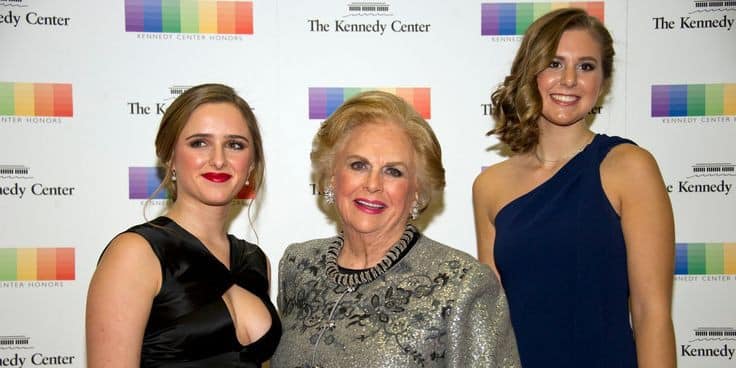
Mars, Incorporated, now one of the world’s largest privately held food companies, was founded in 1911 by Frank C. Mars with just $400 in savings and a dream of creating confectionery products.
Frank started modestly by producing buttercream candies, but it was under his son Forrest Mars that the company experienced explosive growth. Today, Mars, Inc. stands as a global powerhouse in multiple sectors: confectionery with brands like M&M’s, Snickers, and Milky Way; pet care through Pedigree and Whiskas; and various other food products that stock pantries worldwide. The company employs an impressive workforce exceeding 140,000 people globally, generating billions in annual revenue.
What distinguishes the Mars family from many of its wealthy counterparts is its steadfast commitment to privacy and long-term sustainability. It has consistently prioritized these values over public recognition or short-term gains.
Their philanthropic efforts primarily focus on causes like animal welfare, sustainable agriculture practices, and hunger relief initiatives, often working in partnership with NGOs and research institutions rather than seeking the spotlight.
Despite their tremendous success and generally positive reputation, Mars hasn’t been immune to criticism. The company has faced scrutiny regarding child labor issues in its cocoa supply chains and environmental concerns related to palm oil sourcing practices.
Nevertheless, the family’s discreet but effective stewardship continues to ensure that Mars remains a dominant force in the global food industry. Its legacy spans multiple generations and shows no signs of diminishing.
8. Ambani Family
- Citizenship: India
- Net Worth: About $100–116 billion
- Company: Reliance Industries Limited
- Source of wealth: Petrochemicals, oil and gas, telecommunications (Jio), retail, textiles
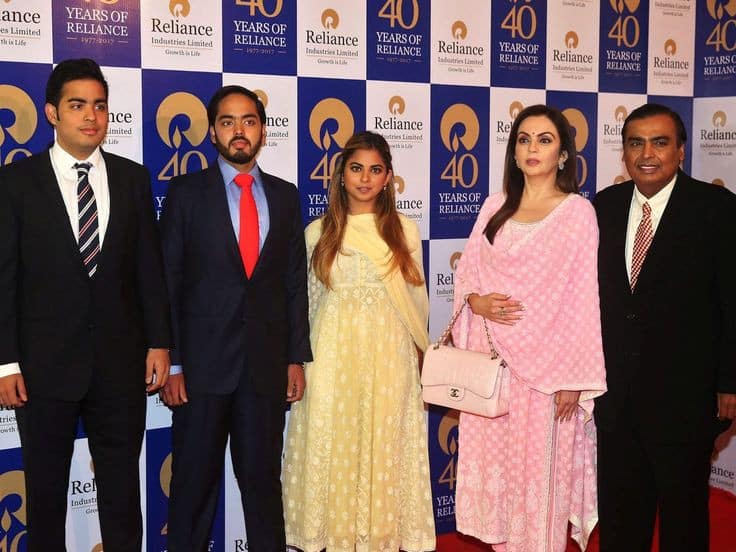
The Ambani family is one of Asia’s wealthiest families. Their fortune sprouts from Reliance Industries Limited, a company Dhirubhai Ambani started in 1966 as a modest textile business. Today, Reliance dominates India’s private sector. Its reach extends across petrochemicals, refining, telecommunications through Jio, retail chains, and digital services. The company directly provides jobs to over 360,000 people, with millions more depending on it indirectly.
Mukesh Ambani leads the family as chairman while his children take on growing roles in the business. Their charitable work happens through the Reliance Foundation, headed by Nita Ambani. This organization tackles rural development, healthcare access, and education initiatives, and helps during disasters throughout India.
Known for their extravagant lifestyle, the Ambani family lives in Antilia, their Mumbai home that ranks among the world’s most expensive private residences. Yet their success has drawn scrutiny, with critics pointing to wealth gaps, favorable government treatment, and worker conflicts.
9. Wertheimer Family
- Citizenship: France
- Net Worth: About $88 billion
- Company: Chanel
- Source of wealth: Luxury fashion, beauty, and accessories; family partnership with Coco Chanel since the 1920s, complete control post-WWII
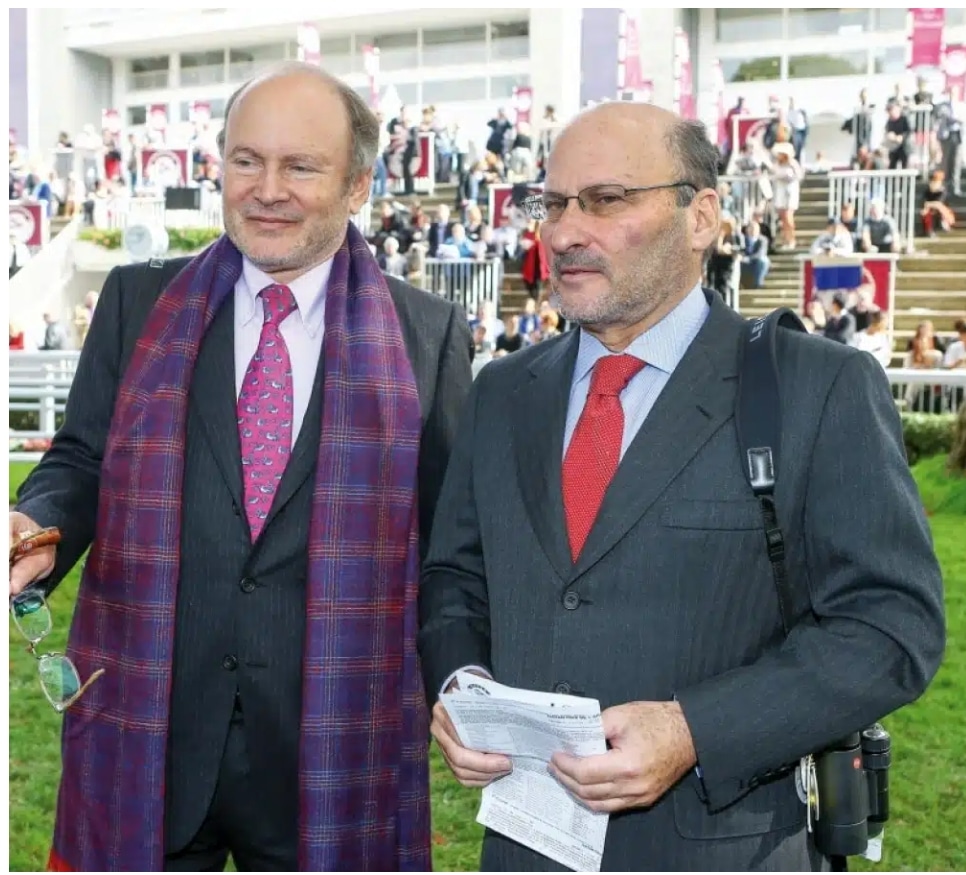
The Wertheimer family owns Chanel, one of fashion’s most iconic luxury brands. Their connection to the company began in the 1920s when Pierre Wertheimer helped finance Coco Chanel’s growing perfume business. After World War II ended, the family gained complete ownership of the company.
Chanel remains private, allowing the Wertheimers to maintain its exclusive reputation and creative freedom. Their products range from high fashion and ready-to-wear clothing to handbags, perfumes, and makeup. The family supports arts and cultural projects, giving money to museums, exhibitions, and preservation efforts.
Brothers Alain and Gérard Wertheimer now run the company together. While some criticize Chanel’s secretive nature, few question its lasting impact on fashion and culture worldwide.
10. Thomson Family
- Citizenship: Canada
- Net Worth: About $68–87 billion
- Company: Thomson Reuters, Woodbridge Company
- Source of wealth: Media, publishing, financial data services; began with newspapers and radio in the 1930s, expanded into global information services
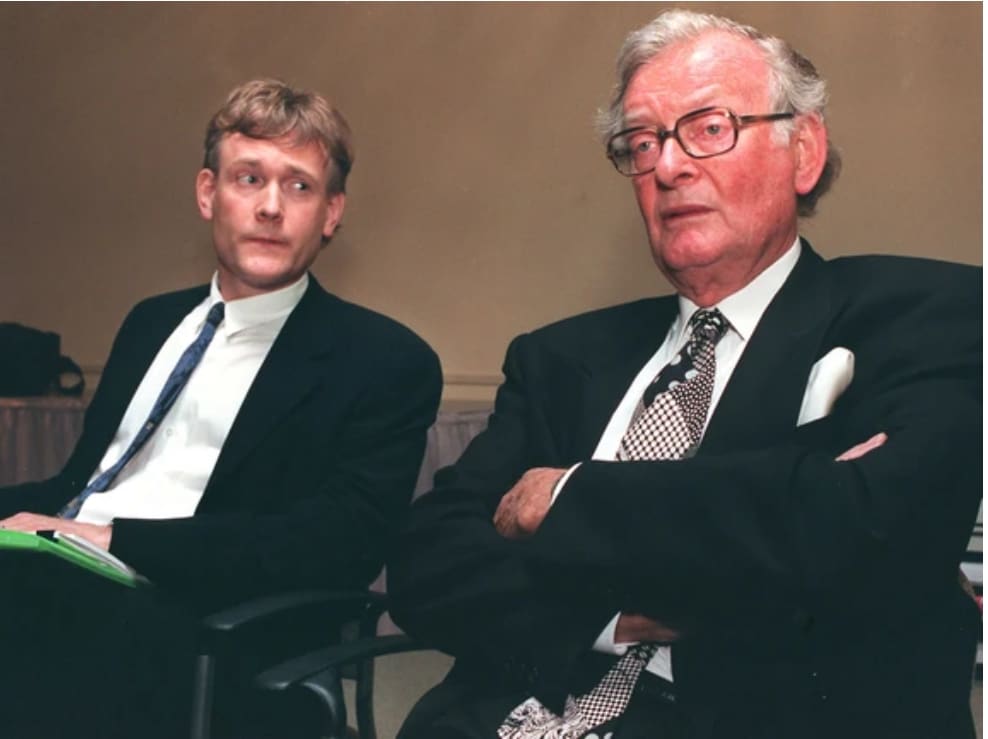
The Thomson family, with an estimated net worth between $68 billion and $87 billion, grew their wealth through media and information services.
Their success story began with Roy Thomson, who started a single radio station in Ontario in the 1930s that gradually expanded into newspapers and publishing. The family’s acquisition of Reuters in 2008 created Thomson Reuters, a global company in financial data, legal information, and news services.
The family controls the business through the Woodbridge Company, a private holding company. Thomson Reuters employs tens of thousands worldwide and serves major financial institutions, law firms, and governments.
The family’s philanthropic efforts focus on journalism, press freedom, and education, primarily through the Thomson Reuters Foundation. Despite concerns about media consolidation and influence, Thomson Reuters remains a trusted source of information globally. The current generation of Thomsons continues to balance business growth with social responsibility.
Now that you know
Of the 10 families that have successfully attained their marks in the world’s wealth book, it’s become evident that wealth-building is both an art and a science. Their stories of wealth vary from sole manship buildup like that of the Waltons, Hermes, Koch, Mars, Ambani, Wertheimer, and Thomas families to monastery privileges plus wealth diversification as seen in the Al Nahya, Al Thani, and Al Saud Families.
However, whether one worked for it or was born into it doesn’t matter. The key characteristic these families share is their dedication and intentional investment in wealth-prone industries such as oil, luxury goods, retail, food, clothing, and accessories.
But here’s the real takeaway: wealth isn’t just about the money—it’s about strategy, consistency, and foresight. It’s a reminder that with the right approach, creating enduring success is possible, no matter where you start.
If this caught your interest, imagine the extent of knowledge we have waiting for you in our following articles. Subscribe now to stay ahead of the learning curve, discover more cool insights and firsthand tech reviews, and find answers to questions you didn’t even know you had.
